Business Ventures →
→

- 22 Mar 2024
- Research & Ideas
Open Source Software: The $9 Trillion Resource Companies Take for Granted
Many companies build their businesses on open source software, code that would cost firms $8.8 trillion to create from scratch if it weren't freely available. Research by Frank Nagle and colleagues puts a value on an economic necessity that will require investment to meet demand.
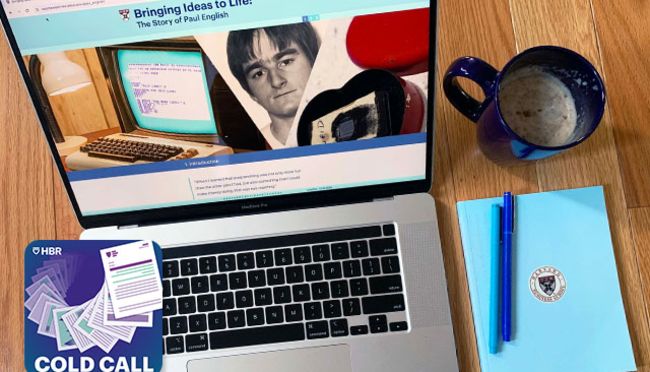
- 12 Mar 2024
- Cold Call Podcast
How to Bring Good Ideas to Life: The Paul English Story
Paul English is one of the most imaginative and successful innovators of his generation. He cofounded several companies, including Kayak, before starting Boston Venture Studio, where he is currently a partner. This multimedia case, “Bringing Ideas to Life: The Story of Paul English,” explores his process of creative idea generation, examining how he was able to bring so many ideas to market. In this episode, Harvard Business School professor Frances Frei and English discuss how to tell the difference between a good idea and a bad one, the importance of iteration, and taking a systematic (but fast) approach to developing new ideas. They also explore how his process dovetails with Frei’s “move fast and fix things,” strategy from her recent book.

- 12 Mar 2024
- HBS Case
How Used Products Can Unlock New Markets: Lessons from Apple's Refurbished iPhones
The idea of reselling old smartphones might have seemed risky for a company known for high-end devices, but refurbished products have become a major profit stream for Apple and an environmental victory. George Serafeim examines Apple's circular model in a case study, and offers insights for other industries.

- 09 Feb 2024
- HBS Case
Slim Chance: Drugs Will Reshape the Weight Loss Industry, But Habit Change Might Be Elusive
Medications such as Ozempic, Wegovy, and Mounjaro have upended a $76 billion industry that has long touted lifestyle shifts as a means to weight loss. Regina Herzlinger says these drugs might bring fast change, especially for busy professionals, but many questions remain unanswered.

- 17 Jan 2024
- HBS Case
Psychological Pricing Tactics to Fight the Inflation Blues
Inflation has slowed from the epic rates of 2021 and 2022, but many consumers still feel pinched. What will it take to encourage them to spend? Thoughtful pricing strategies that empower customers as they make purchasing decisions, says research by Elie Ofek.
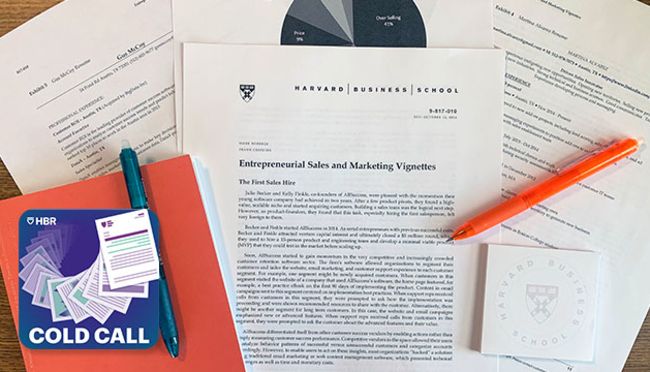
- 05 Dec 2023
- Cold Call Podcast
What Founders Get Wrong about Sales and Marketing
Which sales candidate is a startup’s ideal first hire? What marketing channels are best to invest in? How aggressively should an executive team align sales with customer success? Senior Lecturer Mark Roberge discusses how early-stage founders, sales leaders, and marketing executives can address these challenges as they grow their ventures in the case, “Entrepreneurial Sales and Marketing Vignettes.”

- 09 Nov 2023
- HBS Case
What Will It Take to Confront the Invisible Mental Health Crisis in Business?
The pressure to do more, to be more, is fueling its own silent epidemic. Lauren Cohen discusses the common misperceptions that get in the way of supporting employees' well-being, drawing on case studies about people who have been deeply affected by mental illness.

- 17 Oct 2023
- HBS Case
With Subscription Fatigue Setting In, Companies Need to Think Hard About Fees
Subscriptions are available for everything from dental floss to dog toys, but are consumers tiring of monthly fees? Elie Ofek says that subscription revenue can provide stability, but companies need to tread carefully or risk alienating customers.

- 05 Jul 2023
- Cold Call Podcast
How Unilever Is Preparing for the Future of Work
Launched in 2016, Unilever’s Future of Work initiative aimed to accelerate the speed of change throughout the organization and prepare its workforce for a digitalized and highly automated era. But despite its success over the last three years, the program still faces significant challenges in its implementation. How should Unilever, one of the world's largest consumer goods companies, best prepare and upscale its workforce for the future? How should Unilever adapt and accelerate the speed of change throughout the organization? Is it even possible to lead a systematic, agile workforce transformation across several geographies while accounting for local context? Harvard Business School professor and faculty co-chair of the Managing the Future of Work Project William Kerr and Patrick Hull, Unilever’s vice president of global learning and future of work, discuss how rapid advances in artificial intelligence, machine learning, and automation are changing the nature of work in the case, “Unilever's Response to the Future of Work.”
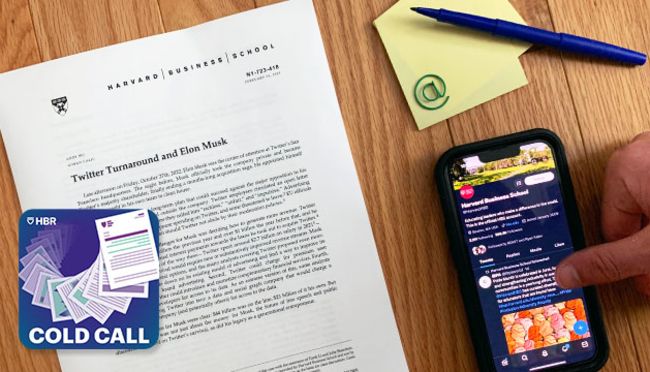
- 20 Jun 2023
- Cold Call Podcast
Elon Musk’s Twitter Takeover: Lessons in Strategic Change
In late October 2022, Elon Musk officially took Twitter private and became the company’s majority shareholder, finally ending a months-long acquisition saga. He appointed himself CEO and brought in his own team to clean house. Musk needed to take decisive steps to succeed against the major opposition to his leadership from both inside and outside the company. Twitter employees circulated an open letter protesting expected layoffs, advertising agencies advised their clients to pause spending on Twitter, and EU officials considered a broader Twitter ban. What short-term actions should Musk take to stabilize the situation, and how should he approach long-term strategy to turn around Twitter? Harvard Business School assistant professor Andy Wu and co-author Goran Calic, associate professor at McMaster University’s DeGroote School of Business, discuss Twitter as a microcosm for the future of media and information in their case, “Twitter Turnaround and Elon Musk.”

- 25 Apr 2023
- Op-Ed
How SHEIN and Temu Conquered Fast Fashion—and Forged a New Business Model
The platforms SHEIN and Temu match consumer demand and factory output, bringing Chinese production to the rest of the world. The companies have remade fast fashion, but their pioneering approach has the potential to go far beyond retail, says John Deighton.

- 03 Jan 2023
- Cold Call Podcast
Wordle: Can a Pandemic Phenomenon Sustain in the Long Term?
Wordle went from a personal game, created by a developer for his girlfriend, to a global phenomenon with two million users in just a few months. Then The New York Times made an unexpected bid to acquire it. But will Wordle outlast other pandemic pastimes? Harvard Business School senior lecturer Christina Wallace discusses the journey of software engineer and accidental entrepreneur Josh Wardle in the case, “Wordle.”
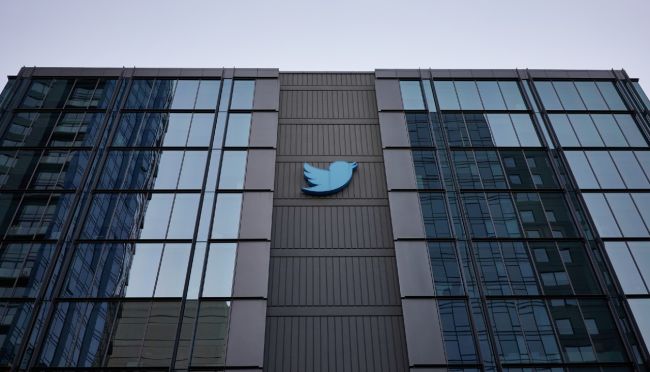
- 29 Nov 2022
- Research & Ideas
Is There a Method to Musk’s Madness on Twitter?
Elon Musk's brash management style has upended the social media platform, but was bold action necessary to address serious problems? Andy Wu discusses the tech entrepreneur's takeover of Twitter.

- 18 Nov 2022
- HBS Case
What Does It Take to Safeguard a Legacy in Asset Management?
Diverse hiring, deep research, and a collaborative culture have defined Brown Capital's successful investment approach. But would those qualities endure after its founder retires? A case study by Luis Viceira and Emily McComb explores how the second-largest Black-founded investment firm is preparing for its next phase.
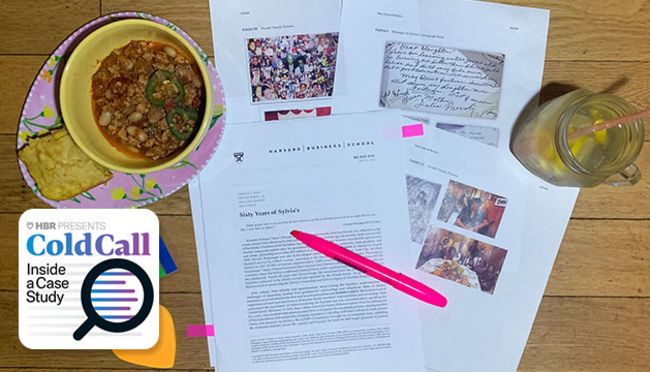
- 15 Nov 2022
- Cold Call Podcast
Planning the Future for Harlem’s Beloved Sylvia’s Restaurant
Sylvia’s Restaurant, which celebrated its 60th anniversary in August 2022, is a testament to the values instilled by the matriarch Sylvia Woods. She cultivated a strong community around her soul food restaurant in New York City’s Harlem neighborhood that has continued to thrive, even after her passing a decade ago. Amid business expansions and succession planning, the legacy of Sylvia Woods continues to live on. But as Sylvia’s grandson takes over the business, a new challenge faces him and his family: what should the next 60 years of Sylvia’s look like? Senior Lecturer Christina Wing and Kenneth De'Sean Woods, chief executive officer of Sylvia Woods Inc., discuss the case, “Sixty Years of Sylvia’s.”

- 19 Oct 2022
- Op-Ed
Cofounder Courtship: How to Find the Right Mate—for Your Startup
Like any other long-term partnership, choosing the right cofounder is a complicated decision with big implications for a venture. Julia Austin offers practical advice for entrepreneurs who are searching for "the one."
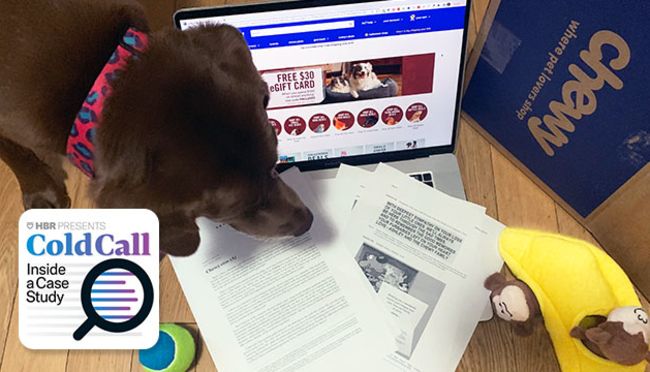
- 18 Oct 2022
- Cold Call Podcast
Chewy.com’s Make-or-Break Logistics Dilemma
In late 2013, Ryan Cohen, cofounder and then-CEO of online pet products retailer Chewy.com, was facing a decision that could determine his company’s future. Should he stay with a third-party logistics provider (3PL) for all of Chewy.com’s e-commerce fulfillment or take that function in house? Cohen was convinced that achieving scale would be essential to making the business work and he worried that the company’s current 3PL may not be able to scale with Chewy.com’s projected growth or maintain the company’s performance standards for service quality and fulfillment. But neither he nor his cofounders had any experience managing logistics, and the company’s board members were pressuring him to leave order fulfillment to the 3PL. They worried that any changes could destabilize the existing 3PL relationship and endanger the viability of the fast-growing business. What should Cohen do? Senior Lecturer Jeffrey Rayport discusses the options in his case, “Chewy.com (A).”
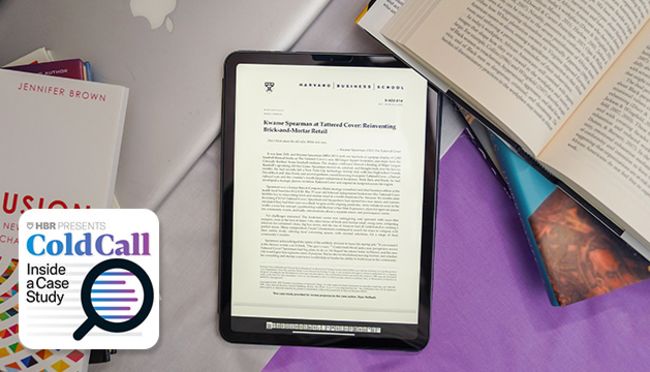
- 06 Sep 2022
- Cold Call Podcast
Reinventing an Iconic Independent Bookstore
In 2020, Kwame Spearman (MBA 2011) made the career-shifting decision to leave a New York City-based consulting job to return to his hometown of Denver, Colorado, and take over an iconic independent bookstore, The Tattered Cover. Spearman saw an opportunity to reinvent the local business to build a sense of community after the pandemic. But he also had to find a way to meet the big challenges facing independent booksellers amid technological change and shifting business models. Professor Ryan Raffaelli and Spearman discuss Spearman’s vision for reinventing The Tattered Cover, as well as larger insights around how local businesses can successfully compete with online and big box retailers in the case, “Kwame Spearman at Tattered Cover: Reinventing Brick-and-Mortar Retail.”
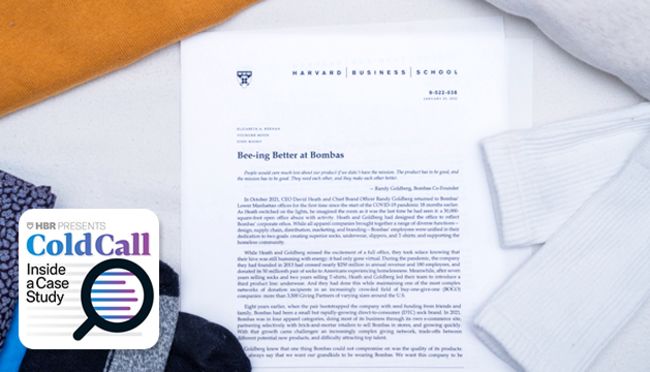
- 26 Jul 2022
- Cold Call Podcast
Can Bombas Reach New Customers while Maintaining Its Social Mission?
Bombas was started in 2013 with a dual mission: to deliver quality socks and donate much-needed footwear to people living in shelters. By 2021, it had become one of America’s most visible buy-one-give-one companies, with over $250 million in annual revenue and 50 million pairs of socks donated. Later, as Bombas expanded into underwear, t-shirts, and slippers, the company struggled to determine what pace of growth would best allow it to reach new customers while maintaining its social mission. Harvard Business School assistant professor Elizabeth Keenan discusses the case, "Bee-ing Better at Bombas."

Sustaining a Legacy of Giving in Turkey
Özyeğin Social Investments was founded by Hüsnü Özyeğin, one of Turkey's most successful entrepreneurs, with a focus on education, health, gender equality, rural development, and disaster relief in Turkey. The company and the Özyeğin family have spent decades serving and improving communities in need. Their efforts led to the creation of one of Turkey’s top universities, the establishment of schools and rehabilitation centers, post 2023 earthquake humanitarian shelter and facilities, nationwide campaigns, and an internationally recognized educational training initiative for young children, among other achievements. Harvard Business School senior lecturer Christina Wing and Murat Özyeğin discuss how the company is a model for making a significant impact across multiple sectors of society through giving and how that legacy can be sustained in the future, in the case, “Özyeğin Social Investments: A Legacy of Giving."